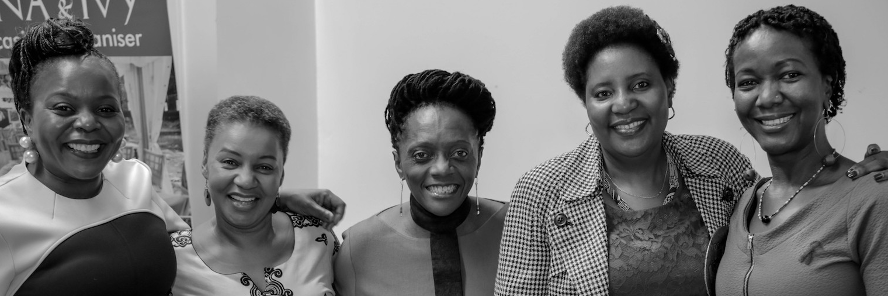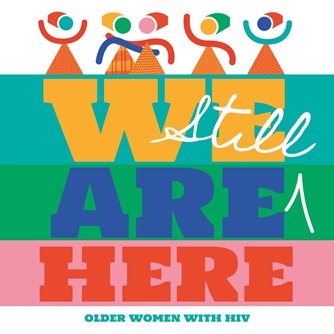
Image: Angelina Namiba with a group of friends who are all living with HIV and are going through or have gone through the menopause. From left to right: Charity, Rebecca, Winnie, Memory and Angelina.
As the life expectancy of people living with HIV increases, a growing number of women are reaching menopause. However, menopause and HIV together create significant challenges, magnifying inequalities and threatening optimal care. As is the case for many women in the general population, menopause may go unrecognised, and in HIV, this is often because many menopause symptoms such as tiredness, night sweats and general malaise are very similar to those of HIV. Further, both menopause and HIV are stigmatised in many cultures and countries – including the UK - so when a woman faces both, she can feel even more invisible.
Over the 40 years since the pandemic began, HIV has been transformed from an almost universally life-threatening condition to a long term, but manageable one for most people who have access to modern, effective treatments. As a result, people living with HIV now have a similar life expectancy to the general population, and more women than ever are entering menopause. Of the approximately 30,000 women living with HIV in the UK, just under 13,000 are in the 45-56 year age group, i.e. of menopausal age.
From discussions with other women, we know that few are told about menopause by their mothers, and until very recently, the subject was rarely discussed among women experiencing it themselves, let alone in general conversation. Additionally, surveys reveal that many women are under-prepared for the menopause, and this includes women with HIV.
Why is understanding the impact of menopause on women with HIV important?
When the stigma associated with HIV is combined with that of menopause, many women find themselves unable to openly discuss two areas of their life that have a profound effect on their wellbeing. Some studies suggest that women living with HIV may be more likely to reach menopause earlier, and suffer more severe symptoms, such as hot flushes, night sweats, anxiety and depression, than women without HIV. Worryingly, severe menopausal symptoms are significantly associated with sub-optimal adherence to antiretroviral therapy and HIV clinic attendance. However, there’s very little published research on the experiences and health of this group of women. Indeed, menopause in the general population is vastly under-researched, even though we know rates of diabetes, cardiovascular disease, osteoporosis, and other conditions such as anxiety and depression increase significantly in women during and after menopause.
Rates of cardiovascular disease, osteoporosis and other co-morbidities are higher in people living with HIV than in the general population even with effective antiretroviral therapy because of the residual inflammation that persists despite virological suppression. It’s therefore crucial to understand the impact of menopause on HIV to be able to identify and optimally manage risk factors and associated co-morbidities.
For a number of different reasons, women with HIV are often diagnosed late and therefore present with symptomatic, advanced disease. Following a long period of viral suppression and feeling well on treatment, as menopause approaches, women start to experience similar feelings to the ones they experienced at the time of their HIV diagnosis – malaise, night sweats, fatigue, joint pains – and worry that their HIV is no longer controlled. Then the ping-pong visits begin; back and forth between HIV physician and general practitioner (GP), the GP saying, “it must be your HIV”, the HIV physician saying, “your viral load is undetectable; it’s nothing to do with your HIV”. This can go on for years, with women shuttling back and forth until one day someone (or the woman herself) thinks “Ah! She’s 47; I wonder if it’s the menopause?” – a diagnosis made even more difficult because for some years during the perimenopause, many women continue to have regular periods. The invisibility that women of perimenopausal and menopausal age in the general population feel is also felt by women living with HIV perhaps even more acutely, for reasons including, but not limited to, those outlined above.
Of relevance in the UK is the fact most women living with HIV come from minority ethnic backgrounds, and despite high levels of education, many live below the poverty line. Additionally, many avoid or delay accessing healthcare because of fear of discrimination or insecure immigration status. The disparities in healthcare that women of colour, including those in minority ethnic groups in the UK, face compared to their white counterparts are well known, and these serve to compound the risk of ill-health for women living with HIV, and are of particular concern for those who are unwilling or unable to access healthcare.
Hormone replacement therapy (HRT) has been shown to improve menopause symptoms, and to prevent and treat osteoporosis. There is also evidence for a reduced risk of coronary heart disease, type 2 diabetes, colorectal cancer and Alzheimer’s disease.
However, rates of HRT uptake in UK women living with HIV appear to be low, with less than 10% of women using systemic preparations and only around 3% using vaginal estrogen.
Finding innovative ways to support women living with HIV through menopause

Image: The logo of the "We are still here" campaign by The Sophia Forum.
The subject of menopause is now being discussed more widely in the general population, but it’s essential that women with HIV are included in these conversations. Thankfully, organisations such as The Sophia Forum provide tremendous support for women with HIV, including those transitioning through menopause. The “We are Still Here” campaign for, and by, older women living with HIV aims to highlight and share experiences, and advocates for holistic services and standards of care. “Bearded and Flushed” is a partnership between UK HIV charities Naz, Sophia Forum, 4M Network of Mentor Mothers and Positively UK whose goal is to support women to discover their creative voice to explore the menopause. The result is a joyful collection of inspirational new writing by 16 women modelling extraordinary talent, courage and wisdom to countless other women going through the menopause. A critical barrier to the optimal provision of menopause care to women living with HIV is the fact that few HIV clinicians are trained in menopause, and primary care physicians may have anxieties about treating women with HIV. However, many HIV physicians are starting to train in menopause and several HIV clinics in the UK are now setting up dedicated or joint menopause services to directly address the needs of this growing group of women.
The Vision for the Women’s Health Strategy for England recognises the impact of stigma on the lives of menopausal women, and this is doubly relevant for women living with HIV. It describes the government’s vision for a new healthcare system, which offers women equal access to effective care and support, prioritising care on the basis of clinical need and not of gender, and this includes women with HIV.
Read more from the Unmet health needs & health inequalities series
More from Unmet health needs & health inequalities
Comments
If you are a British Pharmacological Society member, please
sign in to post comments.